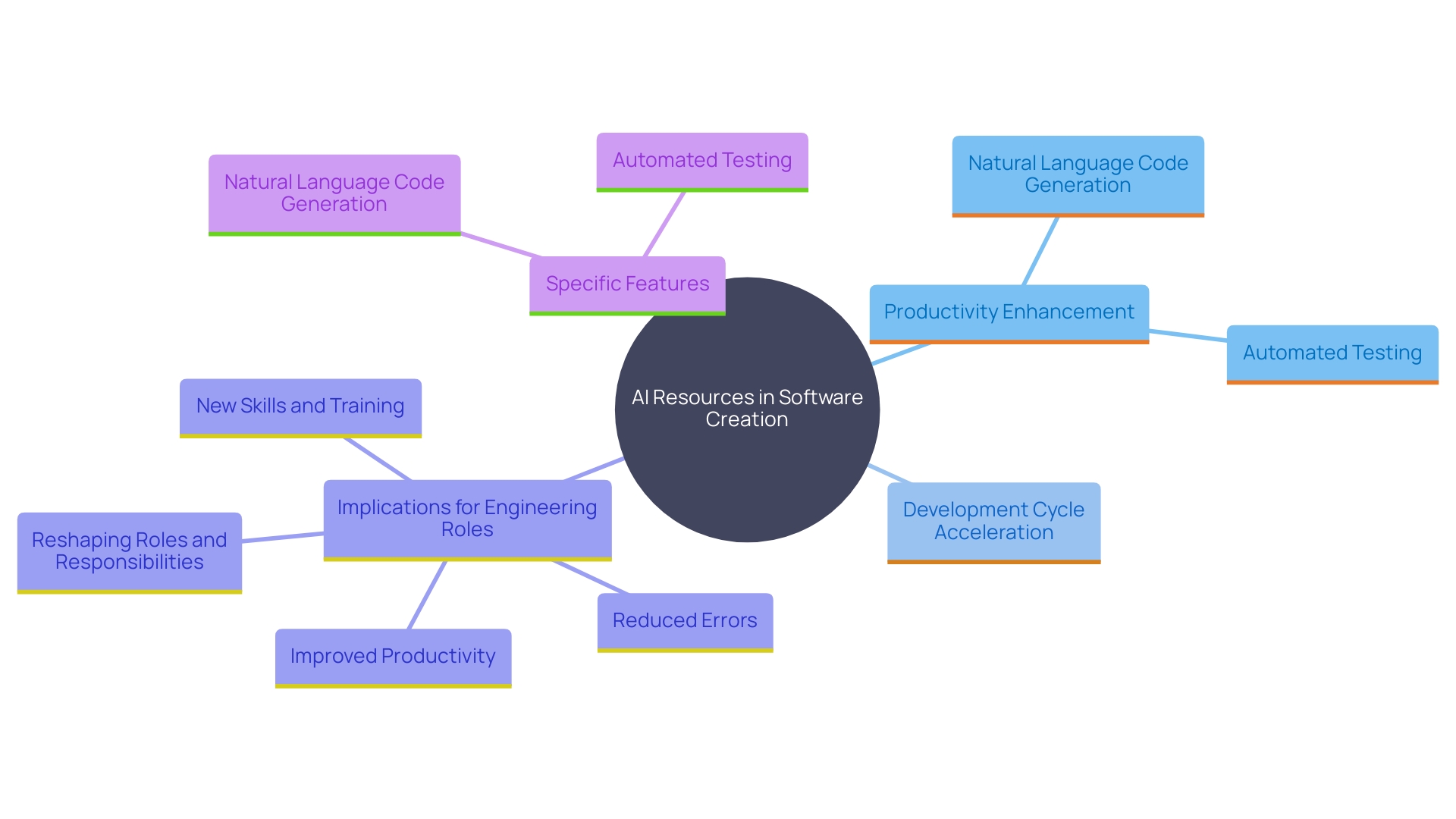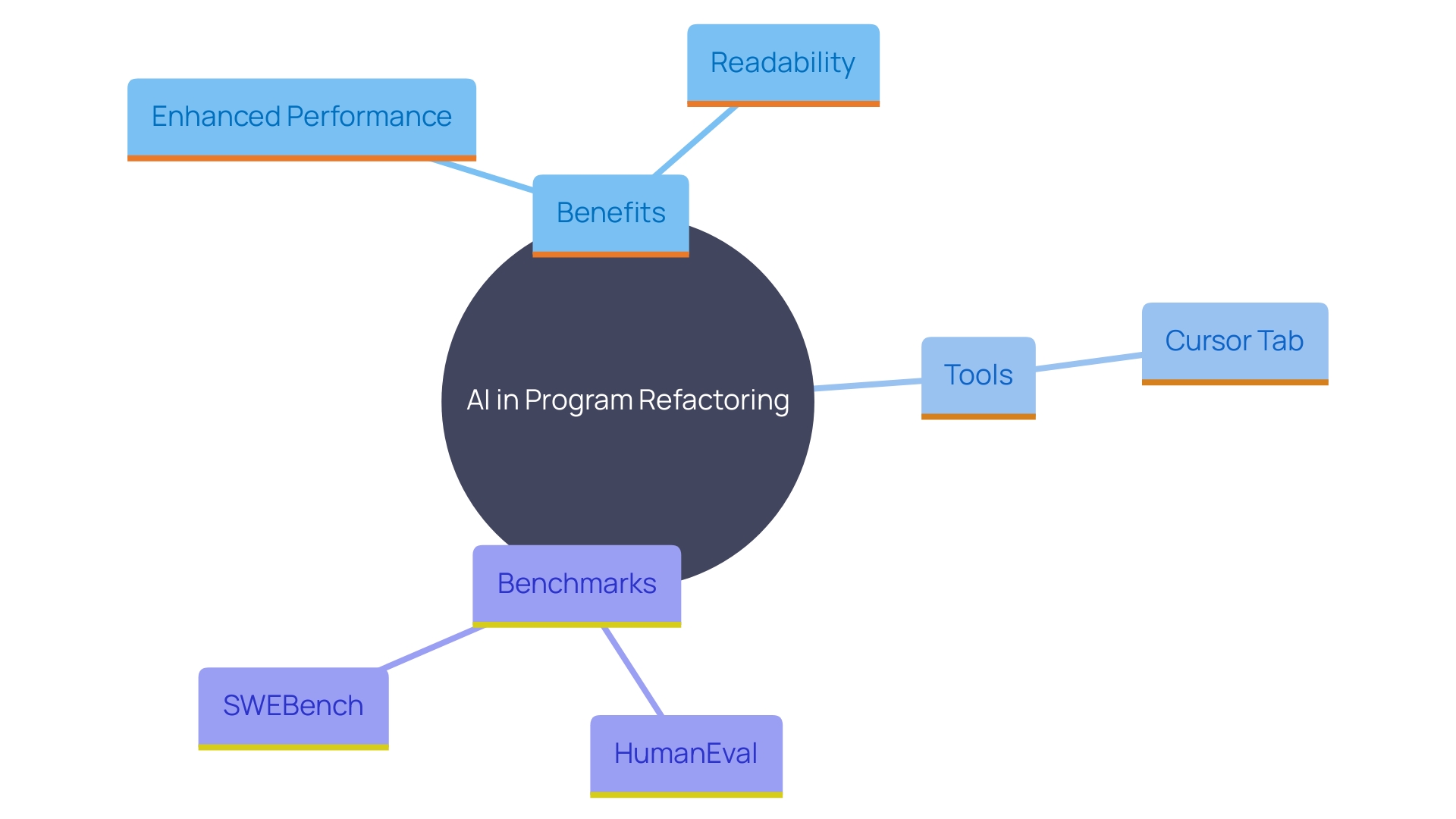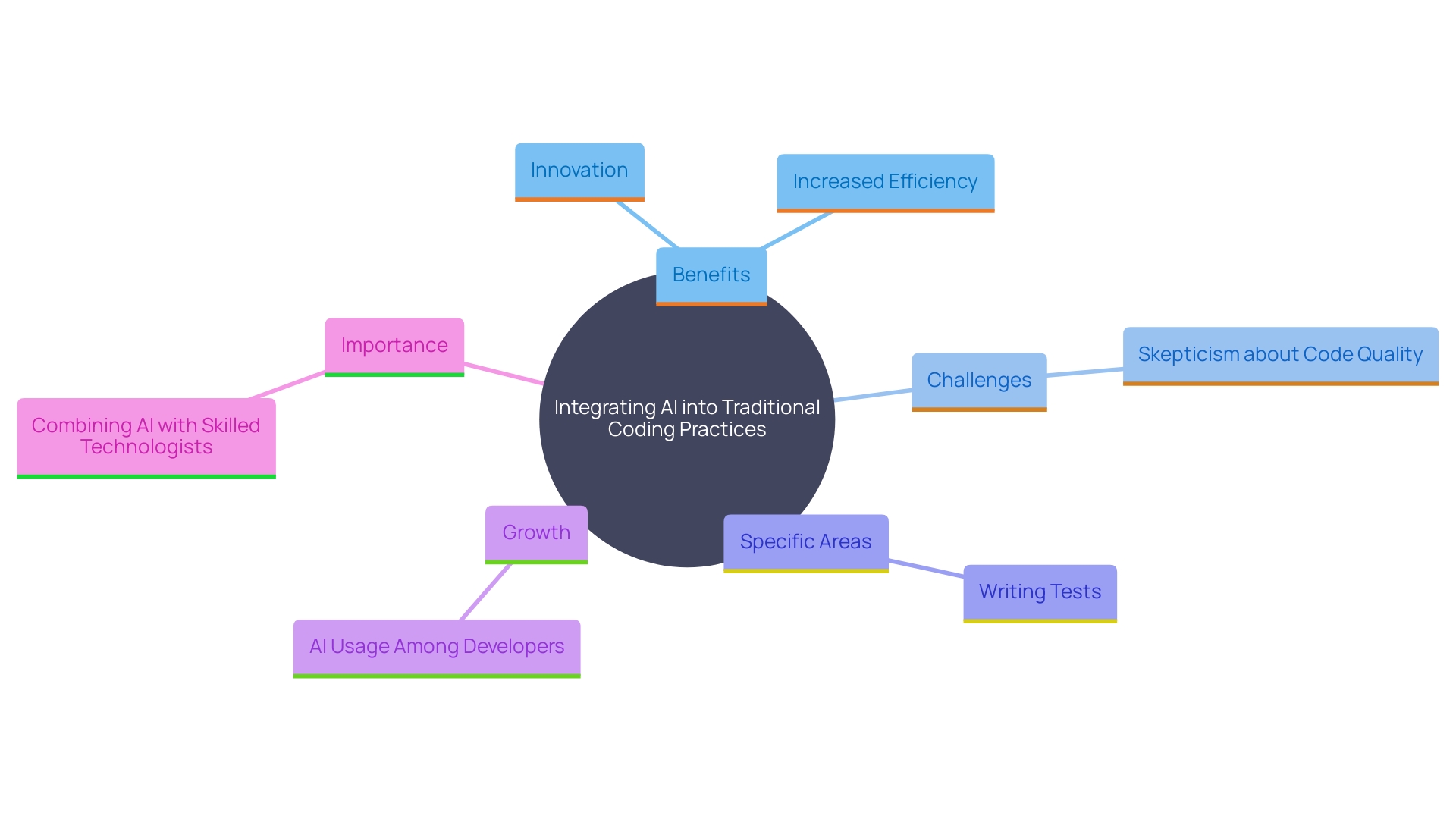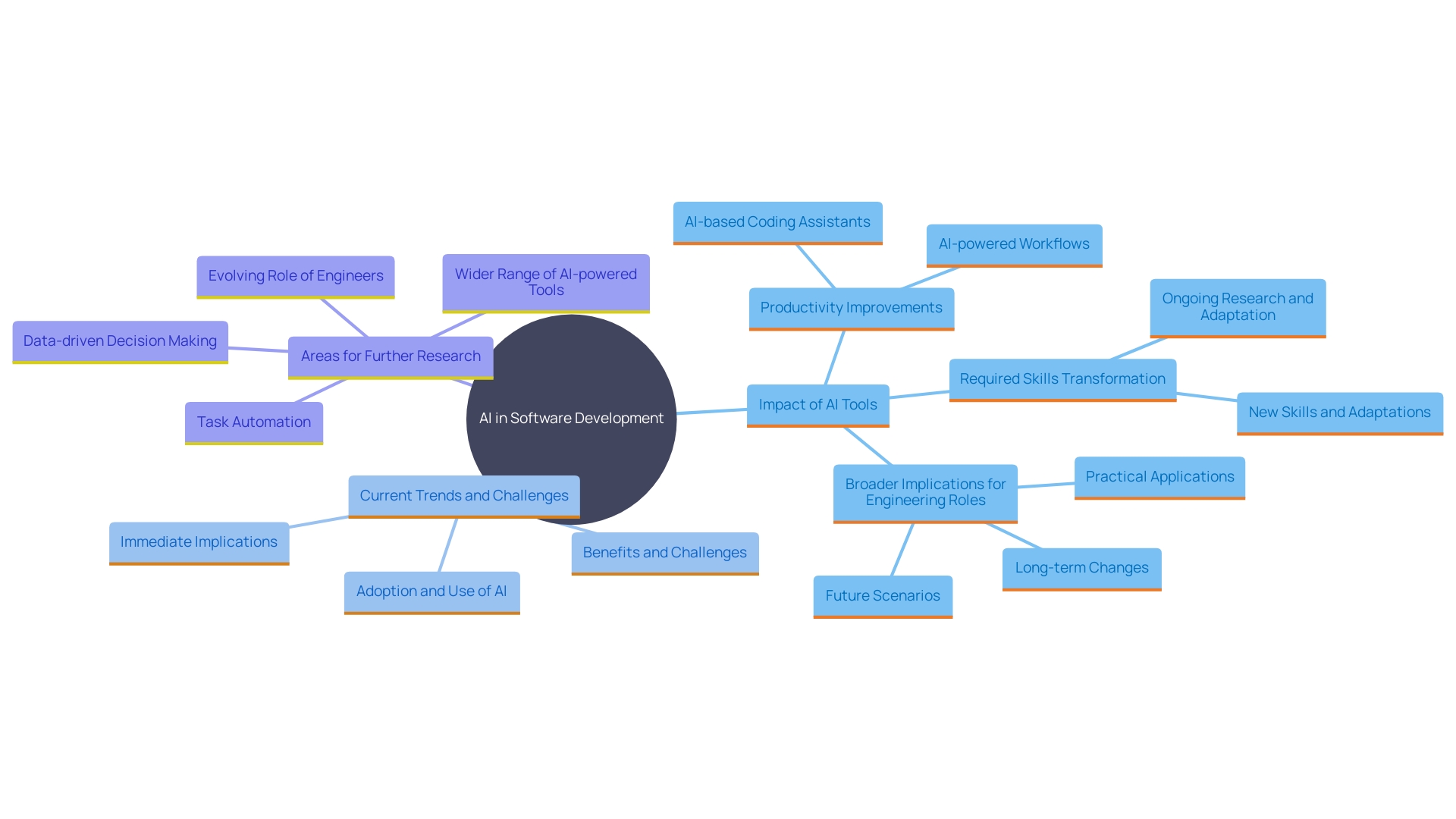Introduction
Artificial Intelligence (AI) is transforming the landscape of software development, offering unprecedented enhancements in efficiency and productivity. By automating repetitive tasks and enabling developers to focus on more complex problems, AI tools are revolutionizing the way software is created and maintained. Features like natural language code generation, automated testing, and intelligent code completion have proven to accelerate development cycles significantly.
Studies indicate that teams utilizing AI-powered tools can complete tasks up to 30% faster compared to traditional methods, a testament to the profound impact of AI on developer productivity. This technological shift not only improves project turnaround times but also reshapes the role of engineers, requiring new skills and continuous learning. As AI continues to evolve, its integration into software development promises to deliver high-quality software more efficiently, transforming industry practices and driving substantial cost savings.
The Role of AI in Enhancing Developer Productivity
AI resources are transforming software creation by automating repetitive tasks and enabling developers to address more intricate challenges. These resources enhance productivity and accelerate development cycles through features like natural language code generation, automated testing, and intelligent code completion. A recent study indicated that teams utilizing AI-driven resources finished tasks approximately 30% quicker than those employing conventional methods. 'This significant improvement in speed and efficiency has profound implications for the future of engineering, suggesting that AI can drive major efficiency gains and cost savings across various industries.'. By reducing errors and streamlining workflows, AI applications not only enhance project turnaround times but also reshape the role and responsibilities of engineers, requiring new skills and training. 'This technological shift is poised to deliver high-quality applications faster, ultimately transforming how companies approach application development.'.

Practical Use Cases of AI Tools in Coding
AI resources are revolutionizing the coding landscape by automating and optimizing various aspects of software development. For instance, GitHub Copilot assists developers by suggesting code snippets based on the context of their work, significantly reducing the time spent on searching for solutions. This is not only a time-saver but also boosts productivity, as shown by a randomized controlled trial where teams utilizing AI resources finished tasks approximately 30% quicker than those employing conventional methods.
AI-driven testing frameworks are another game-changer. These instruments can automatically create test cases, guaranteeing thorough coverage without requiring manual effort. This automation goes further than just completing and testing scripts; AI resources such as Cursor utilize specially trained machine-learning models to foresee the next step based on the context of the script, enhancing the overall development procedure.
The impact of AI on coding is profound, with tools like AI Code Explorer providing human-readable explanations and highlighting key concepts, potential issues, and best practices. This not only assists in integrating new team members but also enhances review processes, conserving hundreds of thousands of engineering hours each year at large scales, like Google.
Moreover, ongoing progress in AI models, like GPT and Claude, is expanding the limits of what can be achieved in generation and editing. For instance, Sonnet has emerged as a frontrunner in generating precise scripts by following user intent, making it a valuable resource in the programmer's toolkit.
'The rapid evolution of these resources suggests a future where AI not only automates routine tasks but also guides developers through complex coding challenges, ultimately transforming the way software is developed and maintained.'.
AI-Driven Code Refactoring and Improvement
Maintaining high programming quality is crucial as projects evolve, and refactoring plays a pivotal role in this process. AI tools are now transforming this task by meticulously analyzing existing frameworks to pinpoint areas for enhancement and suggest optimized structures. This not only boosts performance but also significantly enhances readability, facilitating easier collaboration and maintenance over time.
The incorporation of AI in program refactoring utilizes advanced, custom-trained machine-learning models created for specific functions such as generation, editing, and comparison. For instance, Cursor Tab utilizes a model that forecasts the most probable next action based on the context of the program, streamlining the refactoring process. This sophistication reduces the time and effort needed for traditional reviews, highlighting AI's potential to make comparisons more efficient and intuitive.
Prompt engineering further enhances this capability by effectively communicating with AI systems. By crafting precise and contextually relevant prompts, developers can guide AI models towards desired outcomes, balancing specificity with flexibility to achieve high-quality programming suggestions.
In practical applications, benchmarks such as HumanEval for program generation and SWEBench for bug resolution have shown the worth of AI resources in software engineering tasks. These benchmarks help ensure that AI solutions are both practical and effective in real-world scenarios, driving the continuous improvement and adoption of AI-driven refactoring resources across the industry.

Challenges and Opportunities in AI-Assisted Coding
Integrating AI into traditional coding practices, while beneficial, presents notable challenges. Pushback from programmers is common, primarily due to skepticism about the quality and reliability of AI-generated code. A recent large-scale survey involving 481 programmers revealed that AI assistants are used variably across different development activities, such as implementing new features, writing tests, and refactoring. Developers frequently delegate less enjoyable tasks like writing tests and natural-language artifacts to AI assistants, showcasing a clear preference for automating these areas.
The swift embrace and ongoing progress in AI resources emphasize their transformative potential. For instance, 76% of developers are either utilizing or intending to utilize AI resources in their workflow this year, up from 70% last year. Despite this growth, there are concerns about Ai's impact on code quality, with data showing an uptick in churn code and a decrease in code reuse.
As AI technology continues to evolve, proper training and understanding of its limitations and benefits will be crucial. Experts highlight the significance of combining AI resources with skilled technologists to enhance their potential while reducing risks. By addressing issues such as trust and awareness, AI has the potential to revolutionize coding practices, driving efficiency and innovation in the industry.

The Future of AI in Software Development
The terrain of application development is swiftly changing, with AI leading the way. Recent studies have shown that teams using AI-based coding tools can complete tasks about 30% faster than those relying on traditional methods. This significant boost in productivity underscores Ai's potential to transform the industry. For instance, Turing's AI-accelerated software development study revealed a 25% average increase in programmer productivity, highlighting generative AI's impact on speeding up project delivery and innovation cycles.
As these technologies continue to advance, with more sophisticated AI models like GPT-4o and LLAMA, we can expect even greater enhancements in context understanding and code generation. This evolution is not just limited to speed; it also reshapes the skills required for software creators, emphasizing adaptability and continuous learning. Google's internal resources, for instance, have already experienced extensive use of AI-driven features such as ML-based autocomplete, greatly enhancing programmer productivity and satisfaction.
The broader implications of AI in programming suggest a fundamental shift in the roles and responsibilities of engineers. AI-powered workflows can automate tedious tasks, allowing engineers to focus on higher-value activities. This shift is reflected in the fact that 76% of developers are either using or planning to use AI tools in their development processes this year. As AI technology matures, it will undoubtedly lead to major efficiency gains and cost savings across many industries, reshaping the future of software development.

Conclusion
The integration of AI tools in software development has brought about transformative changes that enhance productivity and efficiency. By automating repetitive tasks such as code generation, testing, and refactoring, these tools allow developers to focus on more complex issues, resulting in significant time savings. Studies indicate that teams utilizing AI can complete tasks up to 30% faster compared to traditional methods, underscoring the substantial impact AI has on development cycles and project turnaround times.
Practical applications of AI tools, such as GitHub Copilot and AI-driven testing frameworks, illustrate how automation not only streamlines workflows but also improves code quality and readability. The ability of AI to provide context-aware suggestions and automate testing processes has proven to save countless hours for developers. This shift not only enhances individual productivity but also transforms team dynamics, necessitating new skills and continuous learning to keep pace with evolving technology.
Despite the challenges associated with AI adoption, including concerns about code quality and developer skepticism, the trend toward integration is clear. With a growing percentage of developers planning to incorporate AI tools into their workflows, the future of software development is poised for significant innovation. As these technologies advance, they will reshape the roles of engineers, enabling them to prioritize higher-value tasks while driving efficiency and cost savings across industries.
The potential for AI to revolutionize coding practices is immense, paving the way for a more productive and dynamic software development landscape.
Frequently Asked Questions
How are AI resources transforming software creation?
AI resources are automating repetitive tasks, enabling developers to focus on more complex challenges. They enhance productivity and accelerate development cycles through features like natural language code generation, automated testing, and intelligent code completion.
What impact do AI resources have on productivity?
A recent study indicated that teams using AI-driven resources completed tasks approximately 30% faster than those using traditional methods. This improvement suggests significant efficiency gains and cost savings across various industries.
How does AI help in automated testing?
AI-driven testing frameworks can automatically create test cases, ensuring thorough coverage without manual effort. Tools like Cursor utilize machine-learning models to predict the next steps based on the context of the script, improving the overall development process.
What are some examples of AI tools assisting developers?
Examples include GitHub Copilot, which suggests code snippets based on context, and AI Code Explorer, which provides human-readable explanations of code, highlighting key concepts and potential issues. These tools save time and enhance collaboration.
How does AI impact code quality and refactoring?
AI tools analyze existing frameworks to identify areas for improvement, suggesting optimized structures that enhance performance and readability. This helps in maintaining high programming quality as projects evolve.
What challenges do developers face when integrating AI into coding practices?
Developers often express skepticism regarding the quality and reliability of AI-generated code. While many are willing to use AI tools, concerns about potential decreases in code quality persist, including increased churn code and reduced code reuse.
What is the trend regarding AI resource adoption among developers?
Currently, 76% of developers are using or planning to use AI resources in their workflows, reflecting a growing acceptance of AI in software development. This is an increase from 70% the previous year.
What skills will be required for engineers as AI technology evolves?
As AI continues to reshape software development, engineers will need to adapt to new tools and workflows, emphasizing continuous learning and the ability to work alongside AI systems.
How is the future of software development expected to change with AI?
AI is likely to automate mundane tasks, allowing engineers to concentrate on higher-value activities. This shift will lead to major efficiency gains and transformation in the roles and responsibilities of software engineers.
What benchmarks are being used to evaluate AI resources in software engineering?
Benchmarks like HumanEval for program generation and SWEBench for bug resolution have been established to ensure AI solutions are practical and effective in real-world scenarios, driving continuous improvement in AI-driven resources.




